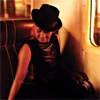Get Away From Me (Columbia)
I would probably be charmed by this teenage cabaret goofball even without her Eminem fixation. But the Eminem fixation helps. On a handful of songs here (most notably the dizzy “Sari”), she approximates Em’s flow—and even his beats—in a way that feels like a celebration of the endless permutations of music itself. “Sari” is not hip hop, exactly, but it treats hip hop the same way McKay treats the whole of American popular song: as a treasure chest ripe for plunder.
Most of the time, she traffics in an updated Carole King/show tune hybrid filled with perky piano runs, oddball arrangements (the liner notes credit her with no fewer than nine instruments, including glockenspiel), and smart-ass one-liners (namechecking Peter Lorre and AC/DC in the same verse). Her songwriting, like her singing and her piano playing, is more enthusiastic than accomplished—but that’s mostly a testament to her enthusiasm. She’s plenty talented, and a good handful of the tunes are instant keepers (“David,” “Ding Dong,” “Clonie”). She’s also 19, which gives her lots of time to work on her self-editing.
There is, of course, no reason for the 58 minutes to be split over two discs. Nor is her anti-Norah Jones shtick necessary (the album’s title is a tweak of Norah’s Come Away With Me); they might have both arisen from New York clubs, but nobody’s going to confuse McKay’s potty-mouthed razzle-dazzle with Jones’ airy restraint. But McKay’s ebullience is endearing even when it’s misdirected—or when she’s threatening to cut your throat. On “Sari,” she muses “I knew I shoulda chose a life of crime.” She might yet. Short of that, I’ll look forward to the inevitable Eminem duet.�
—Jesse Fox Mayshark
Antibalas Afrobeat Orchestra
Who Is This America? (ropeadope)
The Brooklyn-based band’s third full-length CD captures the diversity, attitude, and energy of the New York City borough. Following in the tradition of the late Afro-beat legend Fela Anikulapo-Kuti, Antibalas—“anti-bullets” or “bulletproof” in Spanish—delivers high-powered grooves with a heavy rhythmic base, complimented by big horn lines from its 14-member core. Who Is This America? rarely loses intensity, despite several tracks well over 10 minutes. Surprisingly, however, there are only a few solos throughout the entire album. Instead, short melodic phrases and horn riffs become the focal point of most songs—at times giving Antibalas a James Brown-meets-Tito Puente feel. The sparse vocals of Ernesto Abreu and Nigerian-born Duke Amayo use humor and storytelling to tcomment on underlying social and political themes, while adding a worldly flavor to the diverse sound of the group. The ethnic collective of Asians, Africans, and Middle Easterners creates a true cultural melting pot of musical ideas. Perfect for listening alone or with a group of friends, Who Is This America? fills with the urge to dance, and it’s a great example of Afro-beat’s recent revival.
—Nick Corrigan
Tanya Stephens

Gangsta Blues (VP Records)
Even compared to the libidinous norms of hip hop, Jamaican dancehall is some raunchy shit. At its most tiresome, it takes the form of rote macho strutting, anatomically reductive and hopelessly homophobic. The flipside is a playful, carnival carnality. And if that’s true of the Caribbean lovermen, it’s even more true of the relatively rare women who rise through the scene’s built-in sexism. Tanya Stephens is a case in point—not many women in any genre can touch her unabashedly enthusiastic and comic depictions of female sexuality.
But Stephens is a lot more than a hoochie mama. Gangsta Blues is more bubbly and less beat-driven than standard-issue dancehall. It sounds like it was constructed with an eye on the millions whose only Jamaican LP is a Bob Marley compilation. To underscore the point, there are even a couple of strummed acoustic political anthems. (Not surprisingly, her sex songs work better than her peace songs.) But the album’s resolute pop-ism guarantees a surfeit of hooks, and even a by-the-numbers Wyclef Jean duet doesn’t slow things down for long. With her rich, good-natured voice, Stephens always sounds like she’s laughing with you, even when she’s laughing at you.
She’s rude, in other words—in the best possible ways.
—JFM

June 3, 2004 • Vol. 14, No. 23
© 2004 Metro Pulse
|